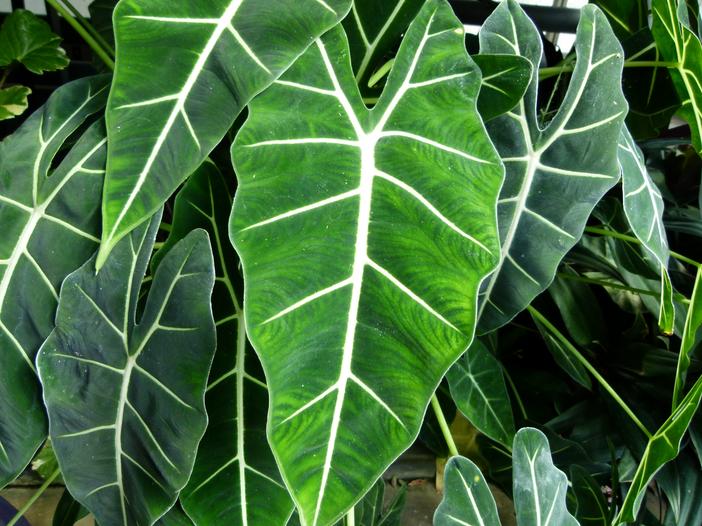Green Velvet Taro
(Alocasia micholitziana)
Green Velvet Taro (Alocasia micholitziana)
/
/

Dinkum
CC0
Image By:
Dinkum
Recorded By:
Copyright:
CC0
Copyright Notice:
Photo by: Dinkum | License Type: CC0 | License URL: http://creativecommons.org/publicdomain/zero/1.0/deed.en | Uploader: Dinkum | Publisher: Wikipedia Commons



















Estimated Native Range
Summary
Alocasia micholitziana, commonly known as Green Velvet Taro, is a perennial herbaceous plant endemic to the island of Luzon in the Philippines, specifically thriving in shady, damp lowland forests and along forest margins. It typically grows to around 20 inches tall and is noted for its striking foliage: deep matte green leaves that are velvety to the touch, with prominent white veins and undulate margins. The petioles can exhibit mottled brownish, reddish, or purple hues, adding to the plant’s ornamental value. The Green Velvet Taro does not produce showy flowers, as it is primarily grown for its attractive foliage.
In cultivation, Alocasia micholitziana ’Frydek’, the most popular cultivar, is prized for its dramatic foliage which makes it a standout in shaded garden areas, as an indoor plant, or in tropical-themed landscapes. It requires consistently moist soil with good drainage and thrives in part shade to full shade conditions. While it is relatively easy to propagate by stem cuttings and seeds, care should be taken to maintain high humidity and avoid overwatering, which can lead to root rot. Potential problems include pests such as spider mites and aphids, especially when grown indoors. Overcollection has made the Green Velvet Taro rare in its native habitat, and it is classified as vulnerable by the IUCN, highlighting the importance of responsible cultivation and trade practices.CC BY-SA 4.0
In cultivation, Alocasia micholitziana ’Frydek’, the most popular cultivar, is prized for its dramatic foliage which makes it a standout in shaded garden areas, as an indoor plant, or in tropical-themed landscapes. It requires consistently moist soil with good drainage and thrives in part shade to full shade conditions. While it is relatively easy to propagate by stem cuttings and seeds, care should be taken to maintain high humidity and avoid overwatering, which can lead to root rot. Potential problems include pests such as spider mites and aphids, especially when grown indoors. Overcollection has made the Green Velvet Taro rare in its native habitat, and it is classified as vulnerable by the IUCN, highlighting the importance of responsible cultivation and trade practices.CC BY-SA 4.0
Plant Description
- Plant Type: Herb
- Height: 2-3 feet
- Width: 1.5-2 feet
- Growth Rate: Moderate
- Flower Color: Non-Flowering
- Flowering Season: Non-Flowering
- Leaf Retention: Evergreen
Growth Requirements
- Sun: Part Shade, Full Shade
- Water: High
- Drainage: Medium
Common Uses
Potted Plant
Natural Habitat
Endemic to shady, damp lowland forests and along forest margins on the island of Luzon in the Philippines
Other Names
Common Names: Green Velvet , Green-Velvet Alocasia , Micholitz’s Alocasia , Elephant’s-Ear
Scientific Names: Alocasia micholitziana
GBIF Accepted Name: